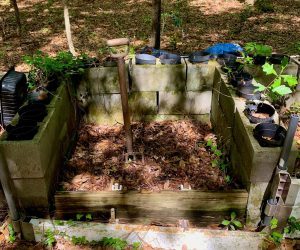Much of the trash that we throwaway can be used to make our gardens more productive, which means more fresh produce to enjoy.
In addition to the information in today’s article, I’ll offer an opportunity for you to register for an upcoming lecture on composting at the end of this article.
There are many materials that can be used to produce compost. Grass clippings, leaves, egg shells, coffee grounds, tea bags, vegetable and fruit clippings, shredded paper and chopped brush are just a few examples of organic matter suitable for composting. Cheese, meat scraps, fats or bones should be avoided because of the potential for attracting pests like flies and rodents. Also, these materials are slower to decompose and may create an odor problem.

Credit: Larry Williams
The size of a compost bin or enclosure may vary but you will need to construct an enclosure at least 3 feet by 3 feet by 3 feet. It can be made from almost anything: wire, wooden pallets, cement blocks, etc. One side of the bin should be either open or removable for ease of adding and removing materials from the bin.
In starting a compost pile, one suggestion is to alternate eight to twelve inches of organic matter, two inches of topsoil and one cup of any complete fertilizer (per layer) until the container is full. Then add enough water to get the material to the consistency of a wet sponge.
The microorganisms in a compost pile must have air to live. Frequently turning the compost pile with a shovel or pitchfork will benefit the bacteria and fungi, resulting in faster decomposition of the organic materials. Also, keep in mind that if the material is chopped or shredded, the faster it is composted.
There are many methods to produce compost. You may need to experiment to determine what works best for you.
I’ll provide a lecture on home composting on Monday, April 15. This approximately one-hour lecture will begin at 10 a.m. at the Okaloosa County Extension Office, located at 3098 Airport Road in Crestview, Florida.
There is no charge to attend but seating is limited and registration is required. Please use this Eventbrite link to register: https://MG-composting0415.eventbrite.com.
If the Eventbrite registration states that it is sold out, please call the UF/IFAS Extension Office in Crestview at 850-689-5850 to see if additional seating is available.
The University of Florida is committed to providing universal access to all of our events. For disability accommodations such as alternate formats of written material, please contact Larry Williams, llw5479@ufl.edu, 850-689-5850 at least one week in advance.
 1
1
